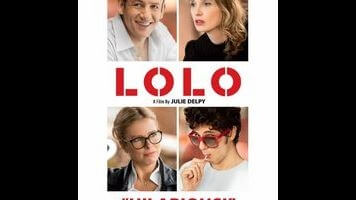Some guys just can’t carry a tuna. Witness Jean-René (Dany Boon), a provincial Frenchman who accidentally drops a freshly caught mackerel in the lap of vacationing Parisian fashion designer Violette (co-writer/director Julie Delpy). It’s definitely a meet-not-so-cute. But despite Violette’s revulsion, there’s something about Jean-René—who comes off like Jean-Paul Belmondo’s bumbling younger brother—that intrigues her. By vacation’s end, the two are nearly inseparable; it helps, as Violette graphically describes to her best friend Ariane (Karin Viard), that he gives great head. Fortunately, he’s about to move to the City Of Light to sell a computer program to a major bank, so the relationship can continue. And maybe, just maybe, the unlucky-in-love Violette can finally settle down.
Not if her demoniacal 19-year-old son Lolo (Vincent Lacoste) has anything to say about it. What intially seems like a charming romantic comedy for the 40-plus demographic quickly reveals itself as a chirpy dark satire about a boy who will do anything to keep his mother all to himself. It turns out that Lolo’s been sabotaging Violette’s relationships for years, driving her boyfriends to madness, covering up his own involvement, and then manipulatively consoling “mommykins” (as he calls her) after the men abscond. Jean-René, so it appears, is the plummiest target of them all. But he soon proves himself a much more resilient foil, if blunderingly so.
Lacoste is perfectly cast as the teenage psycho, so disarmingly beautiful at first glance that it’s easy to miss the sociopathic glint in his eyes. (Not for nothing does Delpy include a moment in which Violette and Jean-René watch the shotgun murder scene from 1960’s Village Of The Damned, both of them blind to its real-life parallels.) Much of this breezily paced black comedy is dedicated to Lolo’s light-slapstick torture of Jean-René: peppering his clothes with itching powder, replacing his computer program with a software-destroying virus, etc. Best in show is Lolo’s drugging of his mother’s style-challenged beau at one of Violette’s fashion events, which results in much stumbling about and an abortive attempt at a selfie with Chanel and Fendi head honcho Karl Lagerfeld, playing himself with a hilarious aura of and-who-might-YOU-be? disdain.
It would be enough to make an entire movie out of these tormenting vignettes, but Lolo’s mask eventually drops and the movie loses its edge. There’s something much more potent about keeping Violette in the dark as to her progeny’s motivations. Delpy is so good at portraying her character’s varied neuroses, which have been unwittingly forged over a lifetime, that her last-act enlightenment feels like a cop-out. (And this despite a very funny last scene that suggests you can never easily nor entirely escape the prison of your own fears and emotions.) The film is at its best when its central trio fumbles around the same circle of hell they’ve obliviously created for themselves, making the best of a situation that is much worse than they could ever imagine.









































